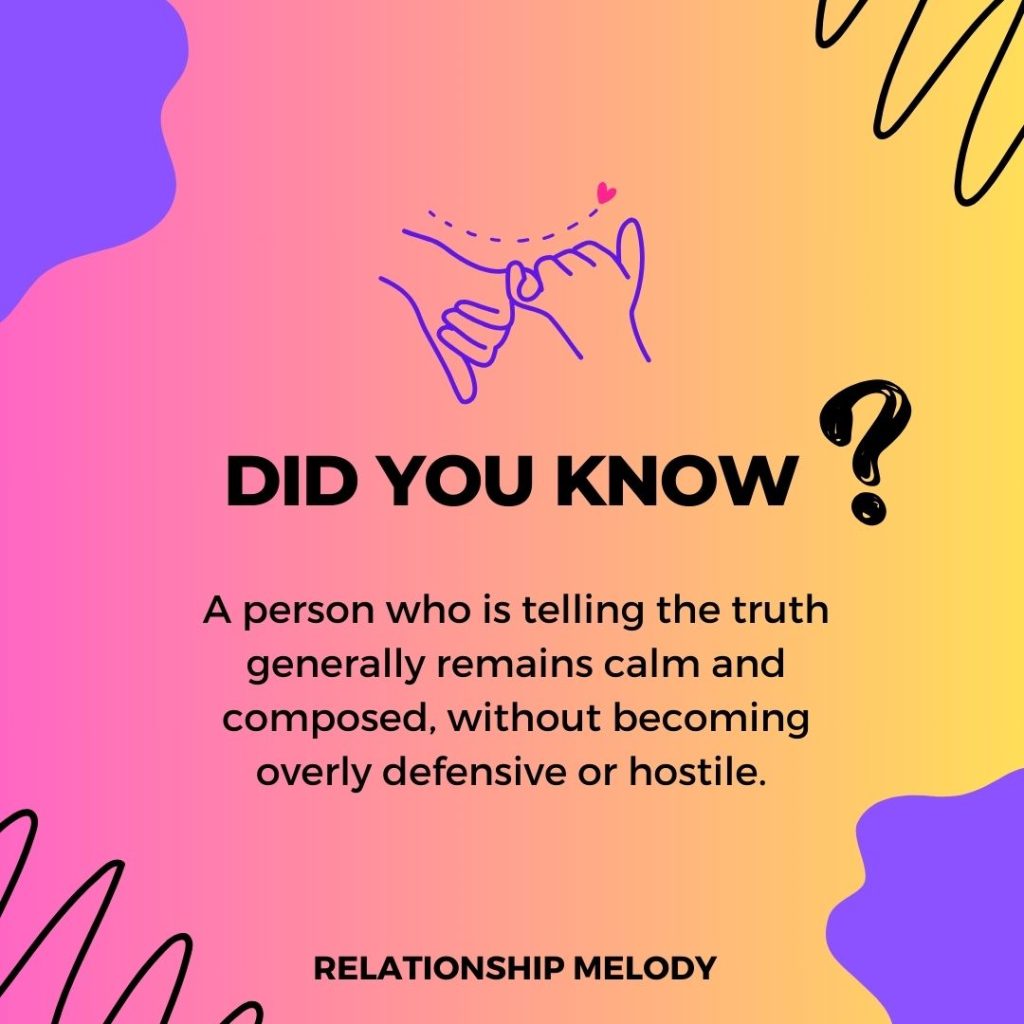25 Signs He Is Telling The Truth
In a world filled with misinformation and deception, it can be challenging to determine when someone is truly being honest. Whether you’re in a relationship, trying to assess a friend’s reliability, or evaluating a potential business partner, the ability to recognize signs of truthfulness is invaluable.
This blog post aims to shed light on 25 key indicators that can help you determine if someone is telling the truth. By understanding these signs, you can enhance your judgment and make more informed decisions in various aspects of your life.
25 Signs He Is Telling The Truth
Here are 25 signs to know.
#1 Consistency:
A truthful person’s statements will remain consistent over time, with minimal contradictions or changes in their story. When someone consistently provides the same information without significant alterations, it suggests honesty and reliability.
#2 Genuine body language:
Non-verbal cues such as maintaining eye contact, relaxed posture, and open gestures indicate sincerity. A person who is telling the truth tends to exhibit these natural and unguarded body language signals.
#3 Facial expressions:
Microexpressions, fleeting emotions that flash across a person’s face, can reveal genuine emotions linked to honesty. These subtle facial cues, which can be challenging to control consciously, offer insights into a person’s true feelings and intentions.
#4 Minimal hesitation:
A person telling the truth will respond promptly and confidently, without excessive pauses or stammering. They are likely to be clear and direct in their communication, without the need to think through fabricated details.
#5 Specific details:
Truthful individuals provide precise and accurate information, incorporating specific dates, locations, and events. Their ability to recall and relay specific details adds credibility to their statements.
#6 Direct answers:
Honest individuals answer questions directly, without deflecting or evading. They address inquiries head-on and demonstrate a willingness to engage in open and transparent conversation.
#7 Voice tone:
A steady and natural voice tone is often a sign of honesty, whereas excessive pitch changes or nervousness might indicate deception. A genuine voice tone reflects a sense of calm and authenticity.
#8 Limited self-enhancement:
Truthful individuals focus on providing accurate information rather than exaggerating their achievements or abilities. They present themselves realistically without the need to inflate their qualities.
#9 Openness to criticism:
A truthful person will be open to feedback and willing to acknowledge their mistakes. They demonstrate a humble and receptive attitude, valuing honesty over ego preservation.
#10 Logical consistency:
Truthful individuals present coherent and logical narratives, avoiding logical fallacies or contradictions. Their explanations and reasoning align consistently, making their account more believable.
#11 Lack of defensiveness:
A person who is telling the truth generally remains calm and composed, without becoming overly defensive or hostile. They are secure in their honesty and do not feel the need to aggressively protect themselves.

#12 Spontaneous responses:
Honest individuals offer spontaneous responses rather than rehearsed or scripted answers. Their immediate reactions reflect genuine thoughts and emotions rather than premeditated fabrication.
#13 Unprompted explanations:
Someone telling the truth often provides additional information or clarifications without being prompted. They proactively offer details to ensure clarity and completeness in their communication.
#14 Congruent verbal and non-verbal cues:
Verbal statements should align with accompanying non-verbal cues for authenticity. When a person’s words and body language are congruent, it signifies a truthful and consistent message.
#15 Limited use of qualifiers:
Excessive use of qualifiers, such as “basically” or “probably,” can be a red flag for potential deception. Truthful individuals tend to communicate with confidence, using qualifiers sparingly.
#16 Emotional consistency:
Genuine emotions are consistent with the context of the situation, and sudden shifts may indicate deception. Truthful individuals display emotions that are appropriate and consistent with the circumstances.
#17 Lack of unnecessary details:
Truthful individuals stick to the essential facts and avoid embellishing their accounts with unnecessary details. They focus on providing relevant information without excessive or irrelevant elaboration.
#18 No excessive sweating:
Sweating profusely, especially in non-strenuous situations, might indicate dishonesty. Increased perspiration can be a physical response to anxiety and deception.
#19 Reliable witnesses:
Corroborating accounts from credible witnesses strengthens the likelihood of someone telling the truth. Multiple consistent testimonies from trustworthy individuals support the veracity of a person’s statements.
#20 Consistent story across contexts:
When a person’s story aligns across different situations or retellings, it increases the likelihood of truthfulness. A consistent narrative across various contexts demonstrates honesty and reliability.
#21 Willingness to provide evidence:
Honest individuals are often willing to provide evidence or supporting documentation for their claims. They understand the value of substantiating their statements with tangible proof.
#22 Sincere apologies:
When a person takes responsibility and genuinely apologizes for their mistakes, it indicates their commitment to honesty. A truthful individual acknowledges their errors and seeks to make amends.
#23 Empathy and concern:
Truthful individuals demonstrate genuine empathy and concern for others, indicating their sincerity. They show authentic care and consideration for the feelings and well-being of those around them.
#24 Lack of self-contradiction:
Someone telling the truth will have minimal contradictions between their current and past statements. Their accounts remain consistent over time without contradicting earlier versions.
#25 Trustworthiness track record:
A person’s consistent reputation for honesty and reliability serves as a strong indicator of their truthfulness. When someone has consistently demonstrated trustworthy behavior in the past, it increases the likelihood of them telling the truth in the present.
Read more: Signs He Is Testing The Waters.
Conclusion:
Recognizing the signs of truthfulness is a valuable skill that can greatly impact your personal and professional life. By paying attention to these 25 indicators, you can become more adept at identifying honesty and making informed decisions.
However, it is essential to remember that no single sign can guarantee someone’s truthfulness, as human behavior is complex and nuanced. Trust should be built over time through consistent behavior and open communication.
By combining these signs with your judgment and intuition, you can navigate the intricate web of truth and falsehood, fostering healthier relationships and achieving greater success in various aspects of life.
Liked Our Article?
Our Patreon link: https://www.patreon.com/RelationshipMelody

Welcome to Relationship Melody! Our website is dedicated to all things on relationships, dating, and love! We are passionate about helping you navigate the ups and downs of love, and our goal is to provide you with valuable insights and information that will make your journey toward a fulfilling relationship smoother and more enjoyable.







